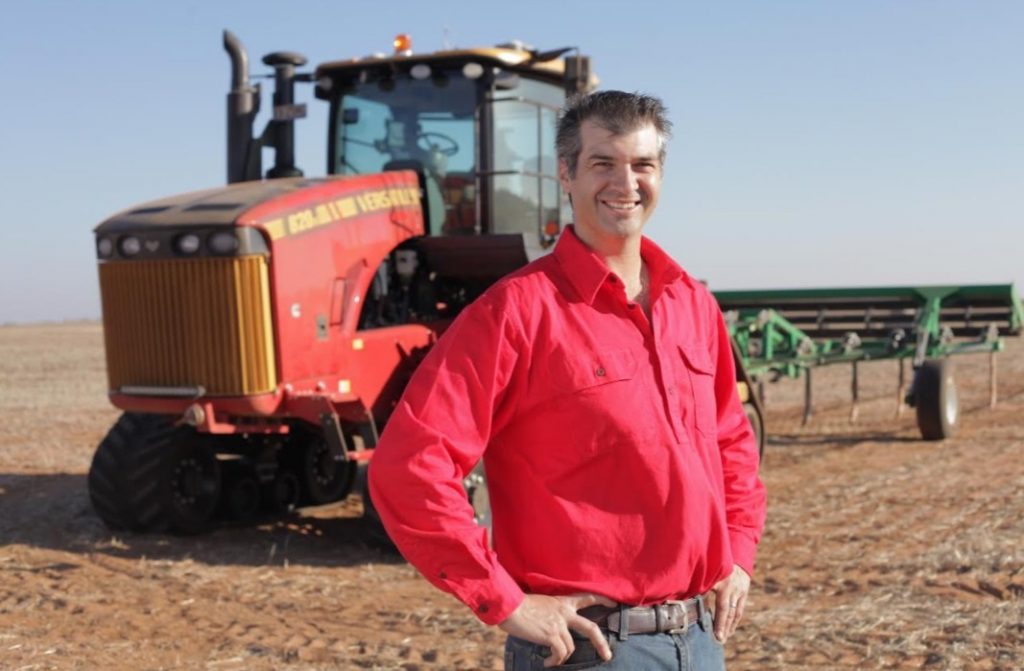
Farm manager Simon Craig is on board with changing farm safety culture.
CHANGING the farm safety culture among workers has been a priority for north-west Victorian farm manager Simon Craig.
“It is very easy for me as a manager to try to tell the men how important safety is, but if they don’t follow it, then it is never going to change,” he said.
Simon has worked as an agronomist and consultant, but when he started managing his father-in-law’s 7000 hectare grain and sheep farm at Kooloonong in 2016, one of his first priorities was to update safety practices.
Simon’s time as an agronomist provided him with a solid background of farm safety knowledge and he wanted to create a positive environment for workers on Lemac Farm.
The operation employs casual workers during the annual harvest, but the busy period left little time for inductions.
“We also work very long hours and are often during those times, which meant you might make more mistakes.”
He has introduced a QR code process, initially for the farm’s 620 horsepower tractor, enabling staff members get instructions and a checklist about operational risks on their mobile phone.
“It makes it a lot easier than even explaining it over the phone.
“It has worked really well and all the staff are on-board.”
Simon said the staff had also upgraded the property’s sheep yards and ramps and all machinery has been fitted with guards where necessary.
“You can’t do all this at once or you would go broke.”
Simon is conscious of the fact that improving safety is a constant process and while his farm is still on its safety journey, his dedication to the safety of workers is his highest priority.
He fosters a culture that encourages workers to speak up about safety and every Monday morning they discuss any issues as a group, including machinery maintenance. At the staff group meetings, workers help identify farm safety risks on the property.
“This is where the cultural change starts.
“If you identify a risk, you also identify how you are going to manage that risk, and getting their involvement is much more important than me sitting in my office or coming up with a heap of processes myself, and not getting their engagement,” he said.
“If they know and have been engaged in what we’re doing, and why we’re trying to do it, then they’ll recommend a simple way to do it to minimise the risk.”
Although there has not been a major accident on the farm, he said the full-time workers also had young children.
“We need to find processes that protect them as well.”
He said the Victorian workplace manslaughter legislation that encompassed family farm businesses made the operation take farm safety more seriously. This led to him engaging with the Victorian Farmers Federation and WorkSafe Victoria.
Simon said the biggest safety risks lie in the “smaller things” like fatigue and chemical use.
WorkSafe campaign targeted ‘bulletproof’ farm safety attitudes
WorkSafe’s recent ‘It’s never you, until it is’ campaign highlighted that farm deaths and life-changing injuries can happen to anyone who doesn’t prioritise safety.
The campaign challenged the common mindset among farmers and agriculture workers that a serious incident won’t happen to them.
WorkSafe executive director of health and safety Julie Nielsen said farmers know their land and machinery like the back of their hand, “but that doesn’t make you bulletproof.”
“It might be easy to think that a tragic incident will never happen on your farm, but if safety is not your top priority then the chances are high that it will.
“Farmers owe it to themselves, their families, their workers and communities to always keep safety front of mind and make it a permanent part of their daily life.”
The campaign was part of a wider push to shift attitudes around farm safety under WorkSafe’s Agriculture Strategy 2020-23.
The strategy sets out how WorkSafe will engage with industry to drive cultural change and encourage a mindset that farm workplace deaths and injuries are preventable, not inevitable.
It focuses on high-risk hazards such as machinery, livestock and chemicals and will collaborate with industry to improve the safety of vulnerable employees, including migrant and seasonal workers.
WorkSafe Victoria said 24 people have died in Victorian farm workplaces over the past three years and accidents happen on Victorian farms every day. On average, one in four of those injured on farms take longer than six months to return to work.

HAVE YOUR SAY